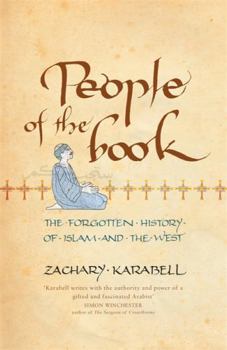People of the Book: The Forgotten History of Islam and the West
We live in a world polarized by the ongoing conflict between Muslims, Christians and Jews, however the relationship between Islam and the West has never been simply one of animosity, but also one of... This description may be from another edition of this product.
Format:Paperback
Language:English
ISBN:0719567556
ISBN13:9780719567551
Release Date:November 2007
Publisher:John Murray Publishers
Length:343 Pages
Weight:0.50 lbs.
Customer Reviews
1 rating
Islam and other religions can coexist and have done so more often than not
Published by Thriftbooks.com User , 16 years ago
This book sets out to show that Islam's relationship with Christianity and Judaism has not always been one of conflict and intolerance, but frequently of mutual intercourse - even at times when their armies were fighting each other. The wars between them, even when religion was invoked, could often be characterized as territorial rather than as religious, and when Harun al-Rashid was fighting Christian Byzantium, he was quite happy to have the Christian Charlemagne as an ally; and Muslims slaughtered fellow-Muslims at least as often as they warred against Christians. Religious passions undoubtedly played a part in the Crusades, but even then the Shi'ite Fatimids at times supported the Christians against the Seljuk Sunnis. The 126 years between the beginning of the First Crusade in 1096 and the end of the last one in 1272 saw only 25 years of actual fighting - and Karabell paints a perhaps excessively rosy picture of the rest of the time, when Muslims and Christians coexisted more or less peacefully in the Middle East and traded with each other, when the Franks began to assimilate, and the Muslims to accommodate themselves to their Christian rulers. Saladin was inspired by genuine religious zeal, but his capture of Jerusalem was not accompanied with a slaughter such as the Crusaders had perpetrated in 1199, and Christian pilgrimage to the city would be permitted when the crusaders sailed home. That Third Crusade, at least on Saladin's side, was still a gentlemanly affair, and has been remembered as such even in the lore of the West. There is an account of the interest in non-Islamic scholarship during the classical age of Islam (8th to 11th century) and during the Golden Age in Arabic Spain of about the same time, reciprocated (for all too brief a period) in early Reconquista Spain where Alfonso the Wise in the 13th century continued the Muslim tradition of convivencia. (One thread running through the book is the interest that many people in the West have shown in Islam and its culture.) Karabell underlines that for thousands of years the Muslims made no attempts to impose Islam on the peoples they conquered, and respected their religious authorities; that in that respect they were far more tolerant than Christian societies, and that this was in fact one of the reasons why, during their early expansion, there was so little resistance by Monophysites in Syria, Copts in Egypt, Nestorians in Persia and Jews everywhere, who had been more persecuted by their previous rulers than they ever were by the Muslims. Especially at times when the Muslim governments in Baghdad, Córdoba or Constantinople felt secure, they were open to debates with or influences from non-Muslims: the occasional persecution of non-Mulims usually coincided with periods when their governments became weak. This weakness was in part due to the long-term effects of the repudiation of classical Islam's openness to the ideas of non-Islamic peoples by al-Ghazali and his fol





